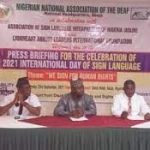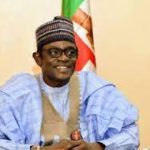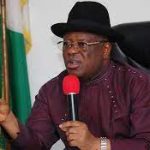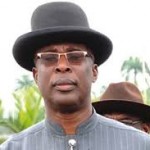That Siege On Buruji Kashamu By Adewale Kupoluyi
Articles/Opinion, Featured, Latest Headlines Sunday, May 31st, 2015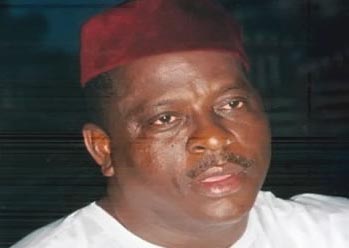
The recent siege laid to the residence of the South West leader of the Peoples Democratic Party (PDP), Prince Buruji Kashamu, by the National Drug Law Enforcement Agency (NDLEA), is pre-emptive and a sad reminder that lawlessness can still rear its ugly head in a civil society where democracy and the rule of law should ordinarily prevail.
The Senator-elect for the Ogun East Senatorial District in the just-concluded National Assembly elections, is facing the threat of extradition to the United States of America for an alleged drug-related offence. In a petition written to the National Human Rights Commission (NHRC), by his counsel, Ajibola Oluyede, he had complained that the US Government, in connivance with the Nigerian security agencies and former President Olusegun Obasanjo, were plotting to extradite him to America to answer criminal charges, the claims NDLEA had warned the Senator-elect to stop further pointing of accusing fingers at the former President, the former Deputy National Chairman of the PDP, Chief Olabode George, as being the brains behind his current travails, urging him to rather concentrate on the facts of his case.
The NDLEA claimed that it had received a formal request for the extradition of Kashamu from the US Embassy for being on the wanted list of both the US Drug Enforcement Administration (DEA) and the Immigration and Customs Enforcement (ICE) of the Department of Homeland Security (DHS). Before now, the US government was said to have attempted twice to secure the extradition of Kashamu from the United Kingdom but failed. According to media reports, the accused was allegedly indicted in the Northern District of Illinois on charges brought against him by ICE. According to the United States court documents, Kashamu was described as the leader of a prolific heroin trafficking ring based in Chicago, Illinois and known as ‘God’, ‘Daddy’ and ‘Kasmal’.
He is allegedly wanted to stand trial on charges of conspiracy and importation of controlled substances, namely heroin, into the United States since 1994, an allegation that Kashamu had denied, saying his case was purely that of mistaken identity because of his semblance with the brother, Adewale, whom he said had already been reported to police authorities in Nigeria, Republic of Benin and Togo concerning his purported drug-dealing activities. The English High Court in December 1999 delivered its judgment and agreed that the order for his committal was null and void having been a product of unfair proceedings in which exculpatory evidence had been suppressed by the prosecutor. Even though, the failed attempt by the US Government to secure an extradition order in the UK failed, the US authorities did not appeal the decision but rather had him re-arrested and commenced another extradition process against him at the Bow Street Magistrate Court in England before District Judge Tim Workman. That effort still did not yield the desired outcome for the American authorities.
In the political circles, his predicaments were said to have begun shortly after he fell apart with former President Obasanjo over the control of the leadership of the PDP in Ogun State. Buruji had been in Obasanjo’s faction of the PDP against the then Ogun State governor, Otunba Gbenga Daniel. After the emergence of President Goodluck Jonathan in the 2011 elections, he was appointed as the Chairman, Organisation and Mobilisation Committee for Jonathan’s re-election in the South-West. He is said to command large supporters and wielded tremendous political power that translated into remarkable results for him even in seemingly difficult circumstances. In his famous resignation letter from the PDP, Obasanjo had said that as the Chairman of an anti-drug body in Africa, he could not continue to be in a party where a wanted drug baron was the leader in his home state. Late last year, the former president had launched a book titled, ‘My Watch’, in which he described Kashamu as a ‘fugitive’. The Senator-elect then went to court, obtaining an injunction restraining Obasanjo from selling the book, although the order has since been vacated.
From the available information, it is difficult to explain the true circumstances behind Kashamu’s ordeal. But what is certain is that the dictates and the demands of the law are not too onerous to be complied with by statutory agencies and persons charged with the responsibility of protecting the sanctity. Rather than the recourse to might, power and force, what Kashamu has experienced can be likened to the military era, where arbitrariness is the order of the day. Under Sections 34, 35, 37 and 41 of the 1999 Constitution of the Federal Republic of Nigeria (as amended), the accused, irrespective of whatever may be the substance of the criminal charge against him, either in the United States of America, is still a Nigerian citizen and his rights must, therefore, be defended against the domineering influence of the US or any other country, the same way America had consistently defended its citizens, no matter how poor or lowly placed in the society. It would be recalled that Dick Cheney, the 46th Vice-President of the US, who was fingered in the notorious Halliburton’s $180 million bribe scandal, was meant to be prosecuted by Nigeria’s Economic and Financial Crimes Commission (EFCC), America still ensured that he was accorded fair hearing by ensuring that due process was followed by avoiding illegal persecution or jungle justice.
One would have expected that if the NDLEA has the extradition request from the US Government, as it claimed, the proper thing to do would have been to secure a warrant of arrest against Kashamu and institute extradition proceedings before the High Court of Justice, especially when Kashamu had already raised an alarm of an alleged a plot to abduct and extradite him, citing information leaked to his lawyer by a Senior Advocate of Nigeria (SAN), who was said to be very close to the former Attorney-General of the Federation and Minister of Justice, Mohammed Adoke.
Now with the judgement delivered by Justice Okon Abang of the Federal High Court, Lagos, the Inspector-General of Police (IGP) and others, including the NDLEA, have now been barred from unconstitutionally arresting and extraditing Kashamu. This is the beauty of the law. As a way forward, if the NDLEA is not satisfied with the ruling of the Federal High Court, it could appeal the judgement but it should stop harassing the accused. Secondly, while I am not labelling Kashamu as either a sinner or saint, there is the need for him to clear his name on moral grounds. Having been elected to the Upper Chamber of the National Assembly to make laws for the good governance of Nigeria, such exalted office demands that its occupant should be above board. Having argued that his brother could have been mistaken for him, he could subject himself to the Deoxyribonucleic Acid (DNA) test to prove his accusers wrong that he is actually a victim of misplaced identity but if at the end of the day, he is found guilty under any law either in Nigeria or elsewhere, he should be punished accordingly.
Related Posts
Short URL: https://www.africanexaminer.com/?p=23807


